We’re heading into sick kid season, so let’s talk about what to do when you have to work with a young sick kid at home.
In 2023, in the middle of post-holidays sick-kid season, I asked people in my community on Instagram and email list for tips. In January 2025, I updated tip 1 in a big way with people generously sharing how they proactively divvied up work with a partner or had other kid-backup in place. Here are all the crowdsourced tips about what to do if you have to work with a young sick kid at home.
Things to do before your kids are sick to prepare
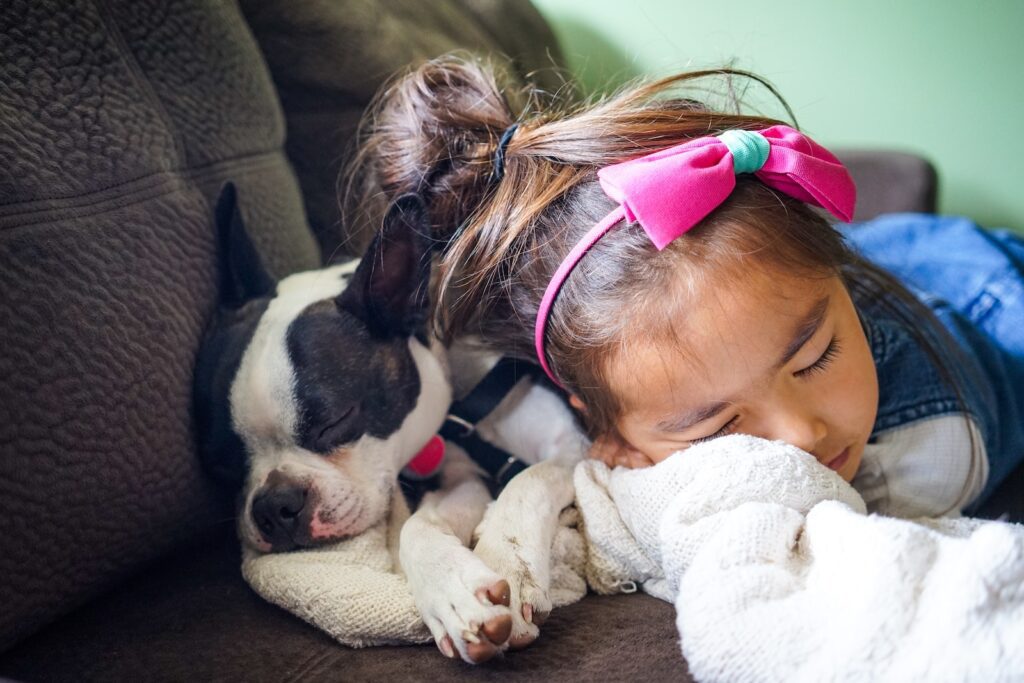
Tip 1: If you have a partner, consider proactively divvying times you play backup – and then plan critical things only for when you have backup [HUGE THANKYOU TO ALL WHO CONTRIBUTED HERE]
Before illness strikes (i.e., now), understand your backup options. If you’re not sure what yours are, calendar 1-3 hours to figure them out. (Tip: Calendar time each August to figure out backup care options for the next academic year – or calendar time before each semester if that’s better for you.)
Before we dig into all of the options, absorb this message from a mom with older kids:

Okay, some options:
Be your own backup: Plan lighter work schedules when germs are likely to hit
One option is to be your own backup in a way. As one woman said, “I also build in a lot of flexibility around times around times that I know a sickness is likely to occur. For example, today/tomorrow (days after New Year’s), I intentionally planned as light days at work – and good thing I did, because my eldest threw up all night! This makes it easy for husband and I to trade off while he watches kids, then we switch, and repeat.
As I mentioned to her, our pediatrician has doctors with zero appointments for the day or two after major holidays, knowing there will be a lot of sick calls. I should ask them which days they do that for and follow suit!
Another option is to build in that flex into your calendar throughout the year:
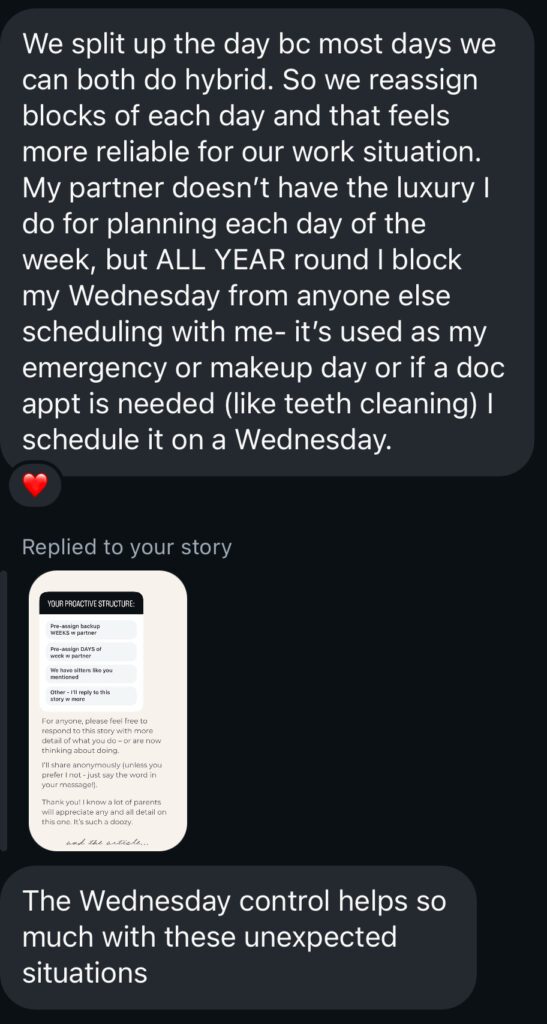
Backup Options with You and Your Partner
I crowdsourced how people proactively divvied up playing childcare backup with the goal of helping people plan life at baseline knowing when meetings/appointments they plan are less likely to need to move v. more.
The responses were brilliant, creative, practical, and smart.
Many of these options come down to each partner’s job’s flexibility and/or jobs where you only get paid if you work – but what I really love is that often couples have figured out a way to not saddle the flexible partner with ALL of the sick kid responsibilities. Read through these like a menu, pick-and-choosing the one(s) that work for you – and leave the rest.
I’m going to copy-and-paste responses here as I think it’s more useful to hear from the women themselves (versus me summarizing their points). So, the options are listed as headings, and the screenshots explain them.
Option 1 of 8: Flexible Partner takes all sick days while Non-Flexible Partner takes all scheduled days off
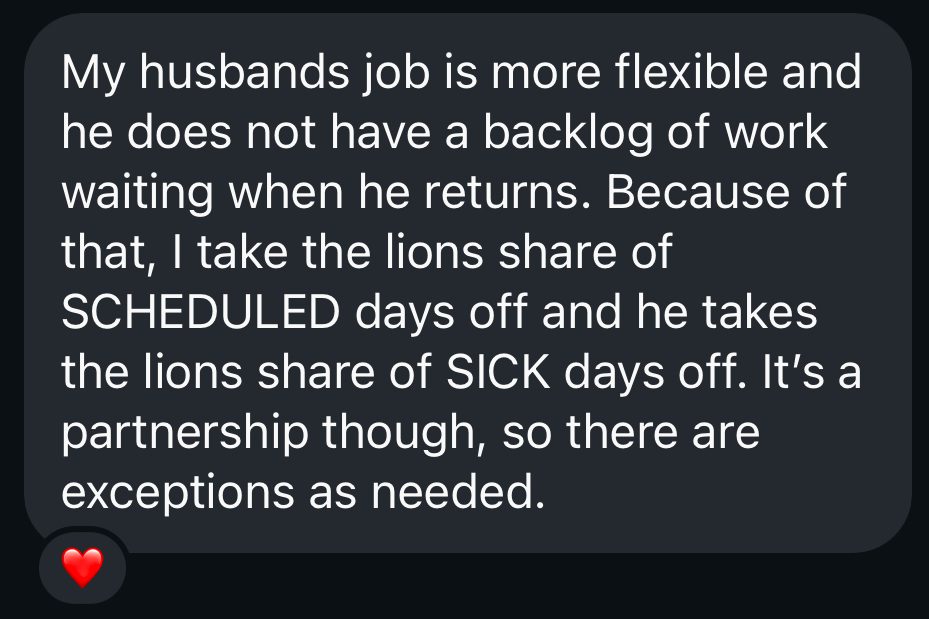
You could also do this with grandparents:
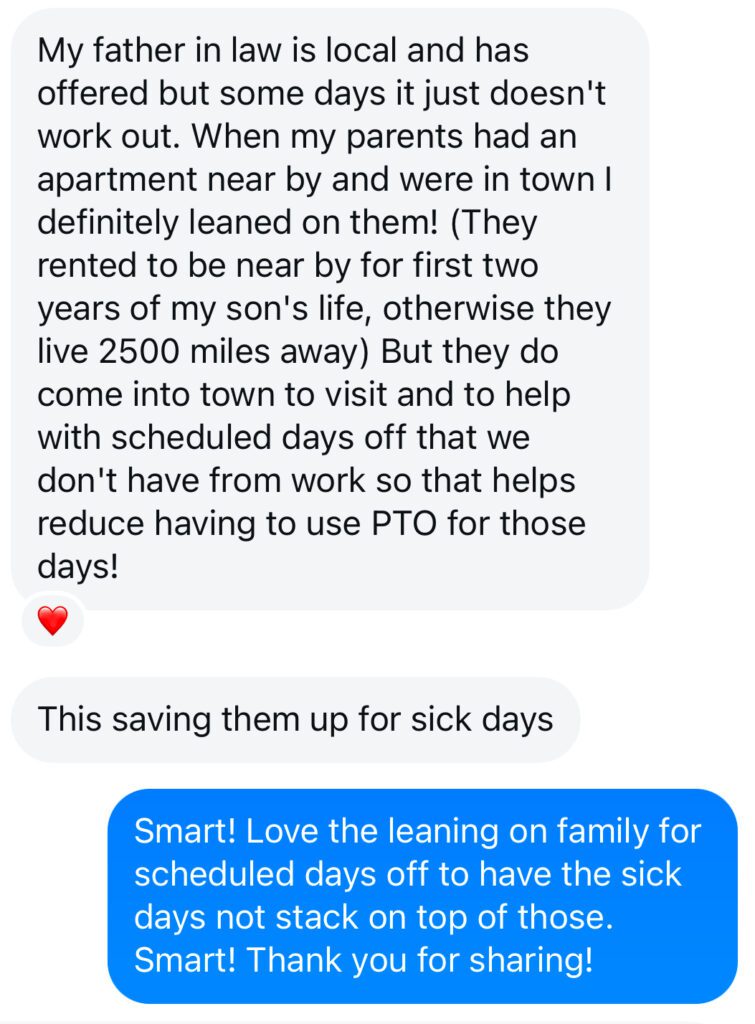
Option 2 of 8: Flexible Partner takes FIRST sick day(s) & Non-Flexible Partner takes LATER days after having more time to rearrange their schedule
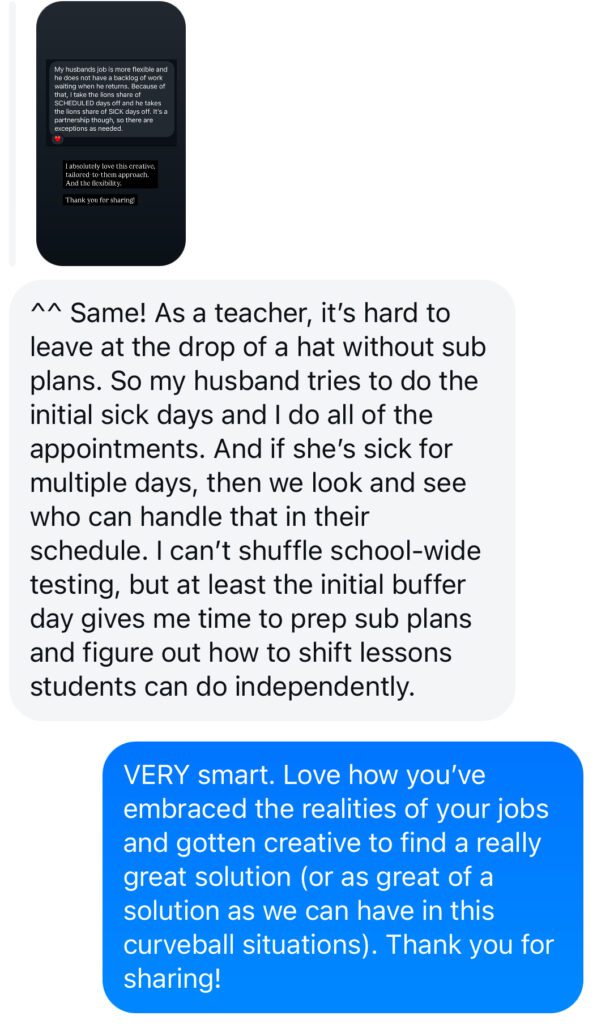
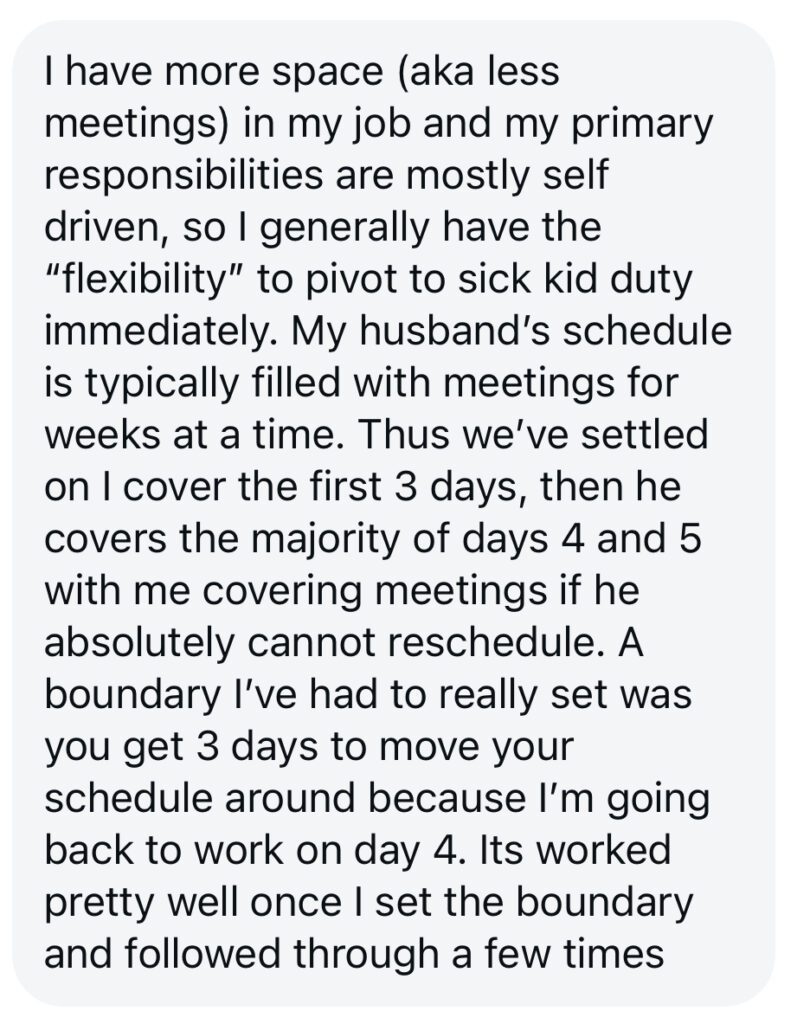
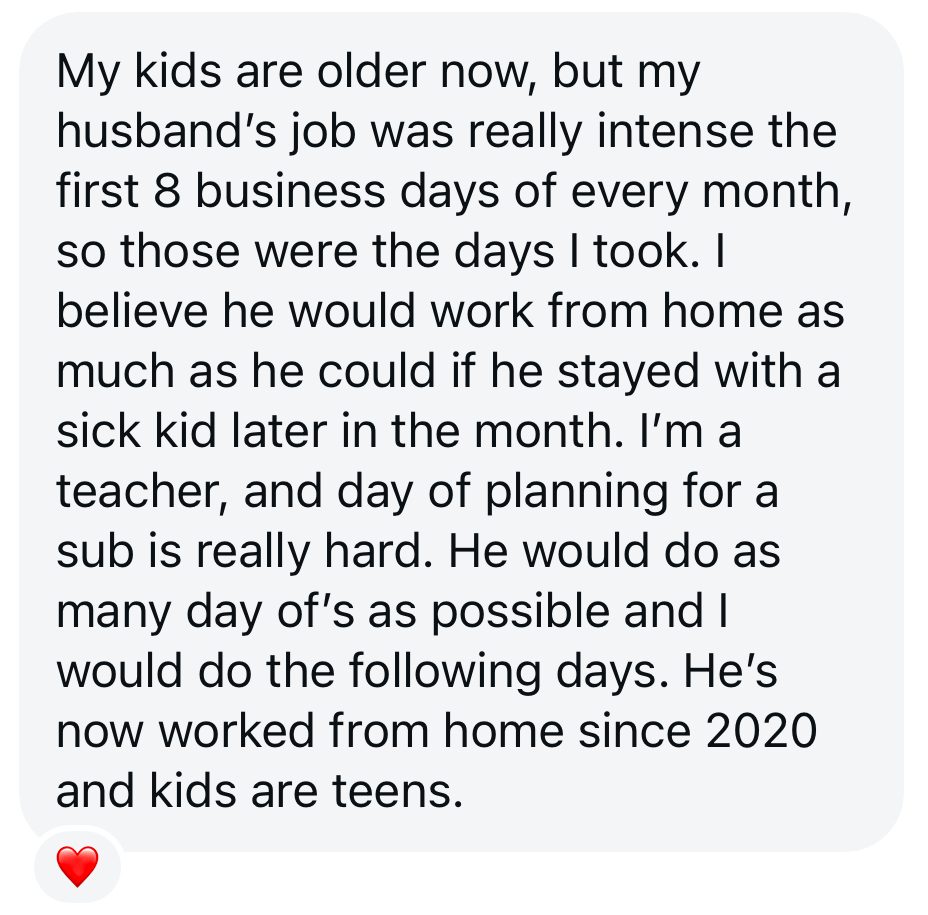
Option 3 of 8: Flexible Parent takes all days where possible
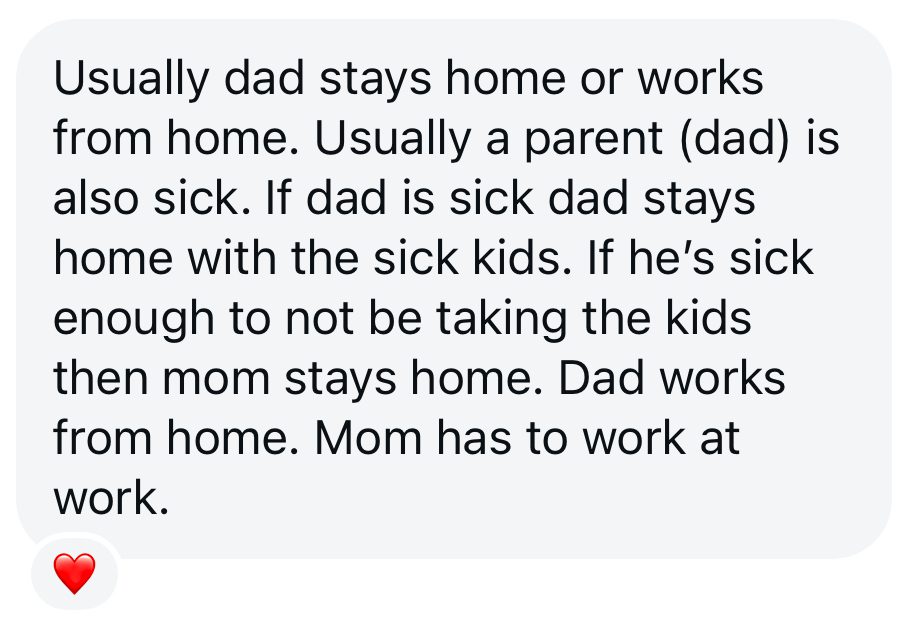
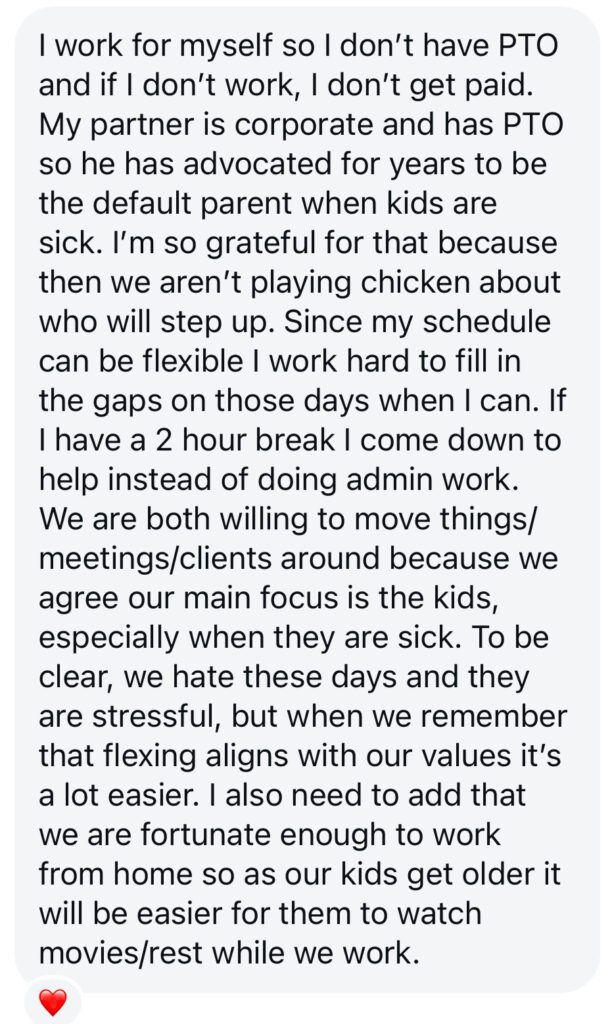
Option 4 of 8: Pre-assign days of the week when people are on backup
I’ve heard from people previously that they’ll pre-assign backup days between partners like, e.g., MWF for Partner 1 and T and Th for Partner 2. You could alternate Fridays or switch up each month.
Option 5 of 8: Pre-assign parts of the day when people are on backup
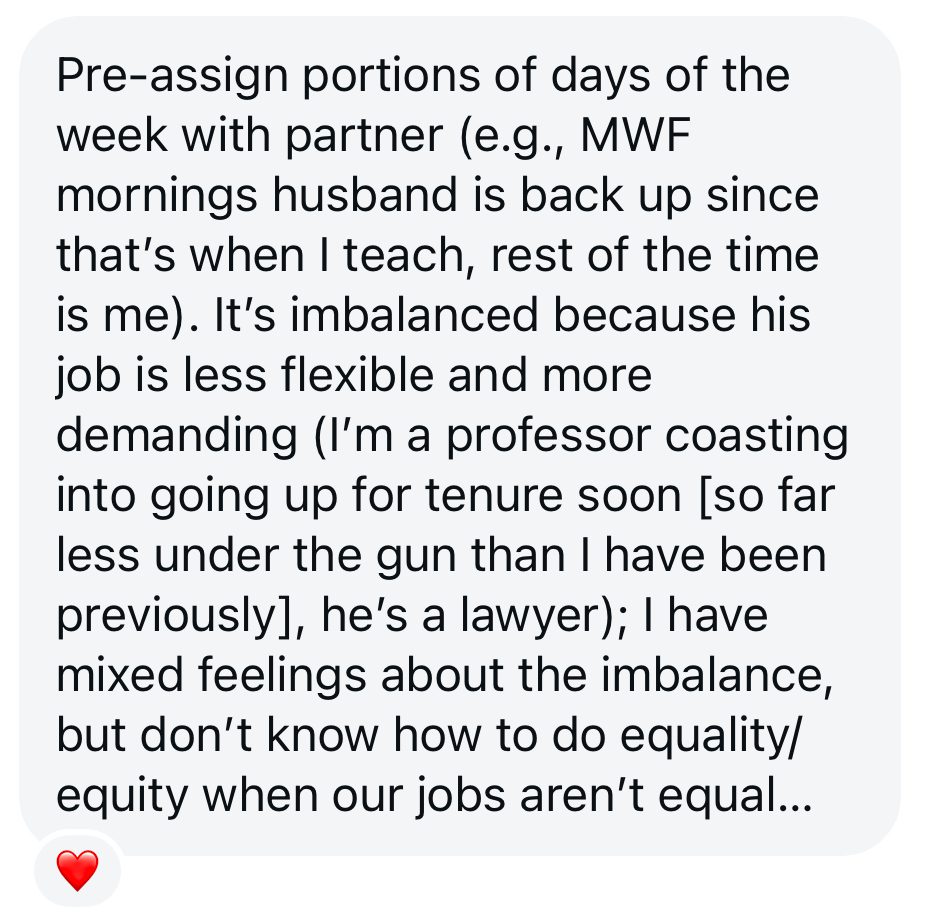
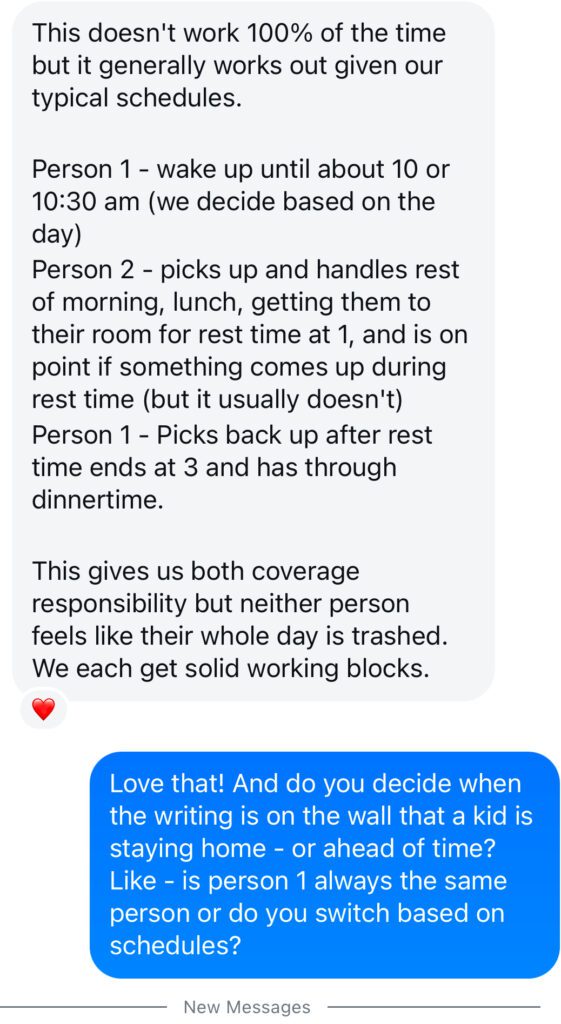
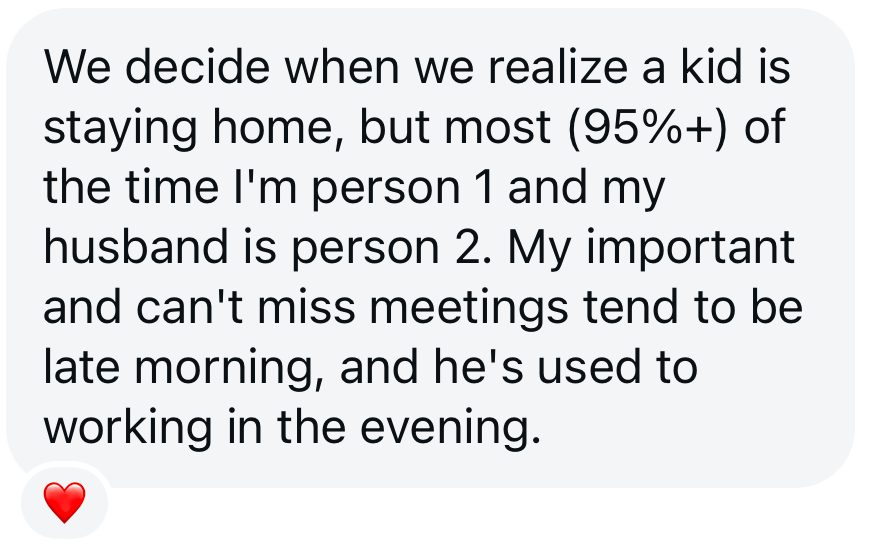

Option 6 of 8: As you schedule important meetings, notify the other partner so they don’t plan something important during that time in case they need to play backup
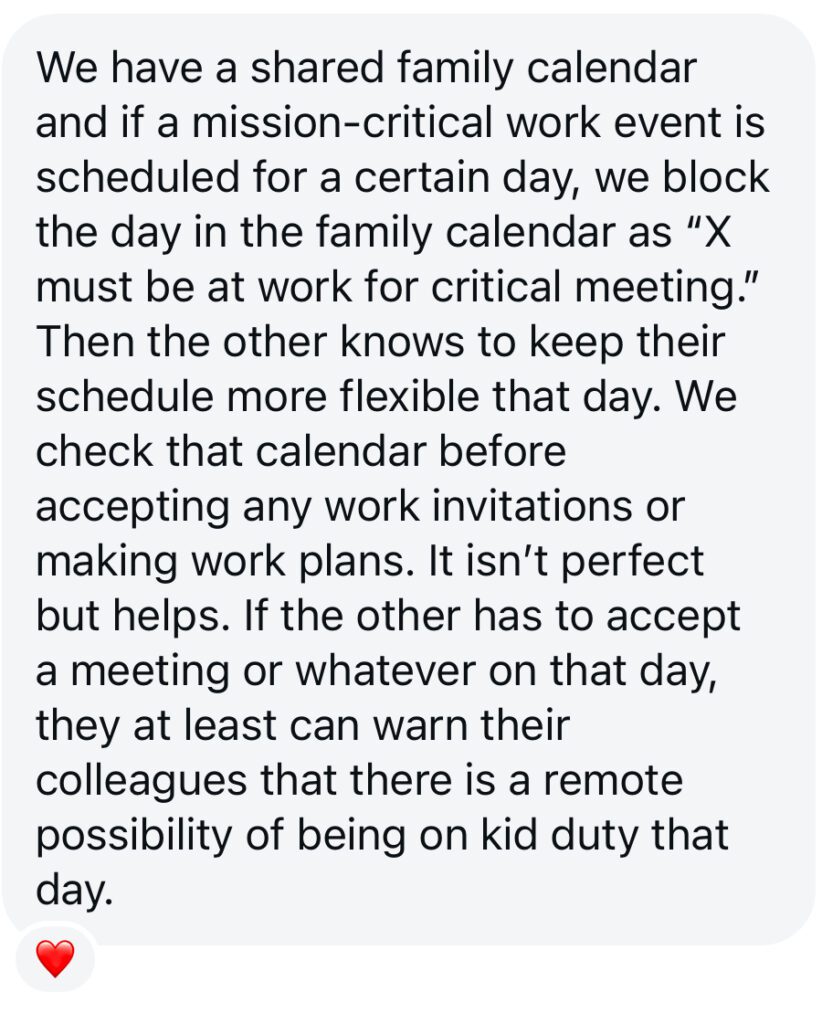
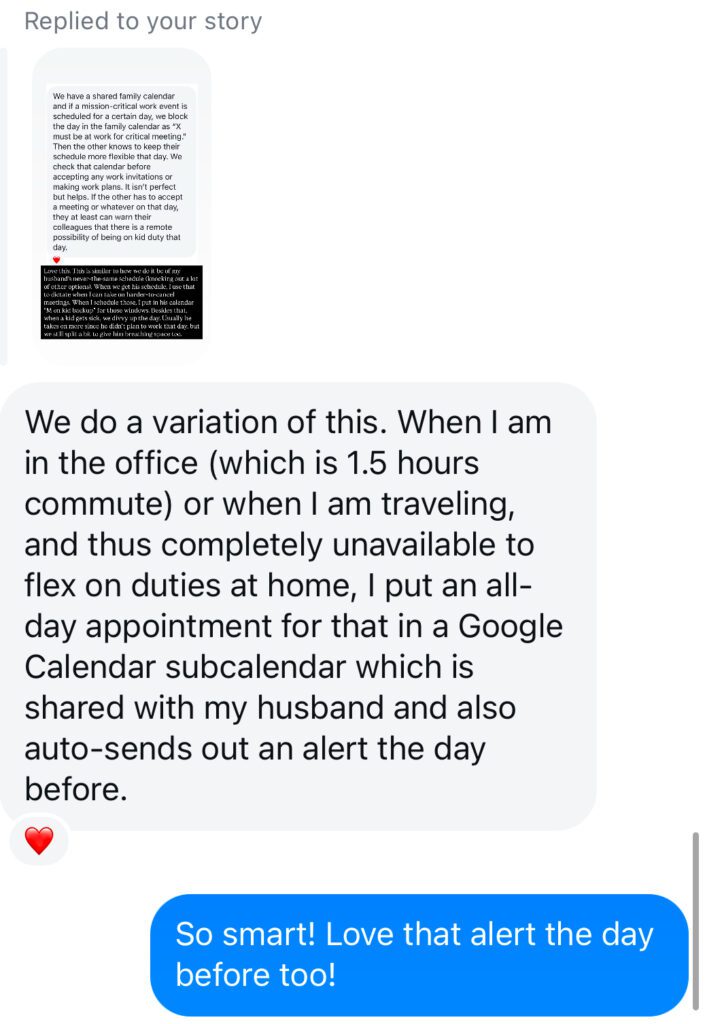
Option 7 of 8: Sunday meetings to divvy up the week:
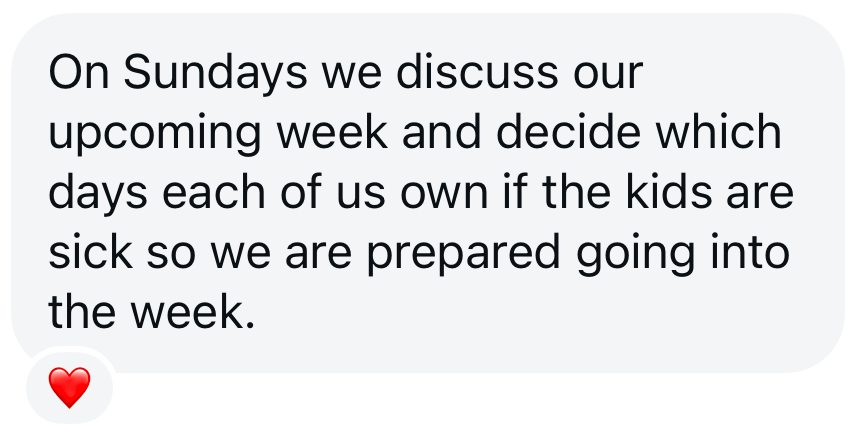
Option 8 of 8: Stagger work schedules if possible:


If your partner doesn’t want to do this…

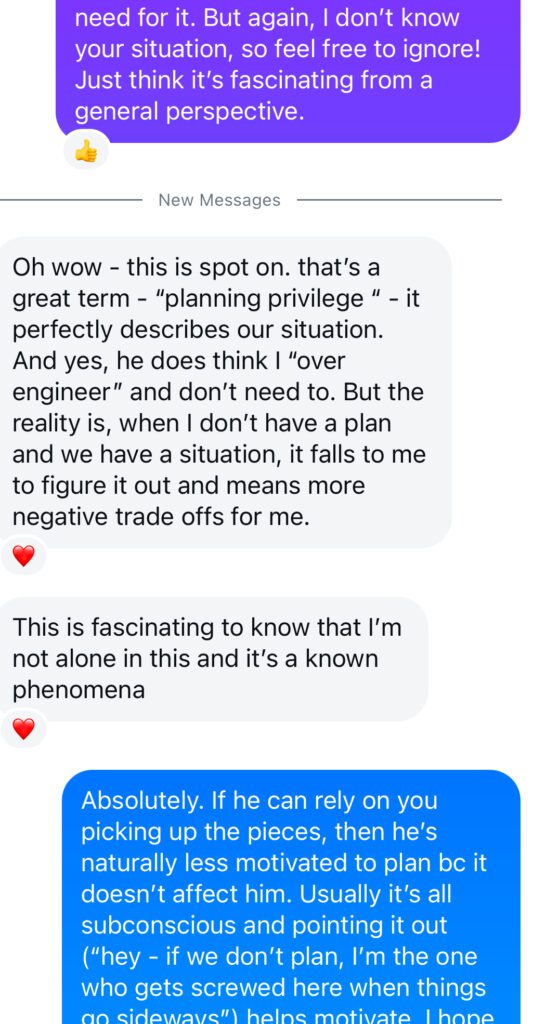

From someone else:
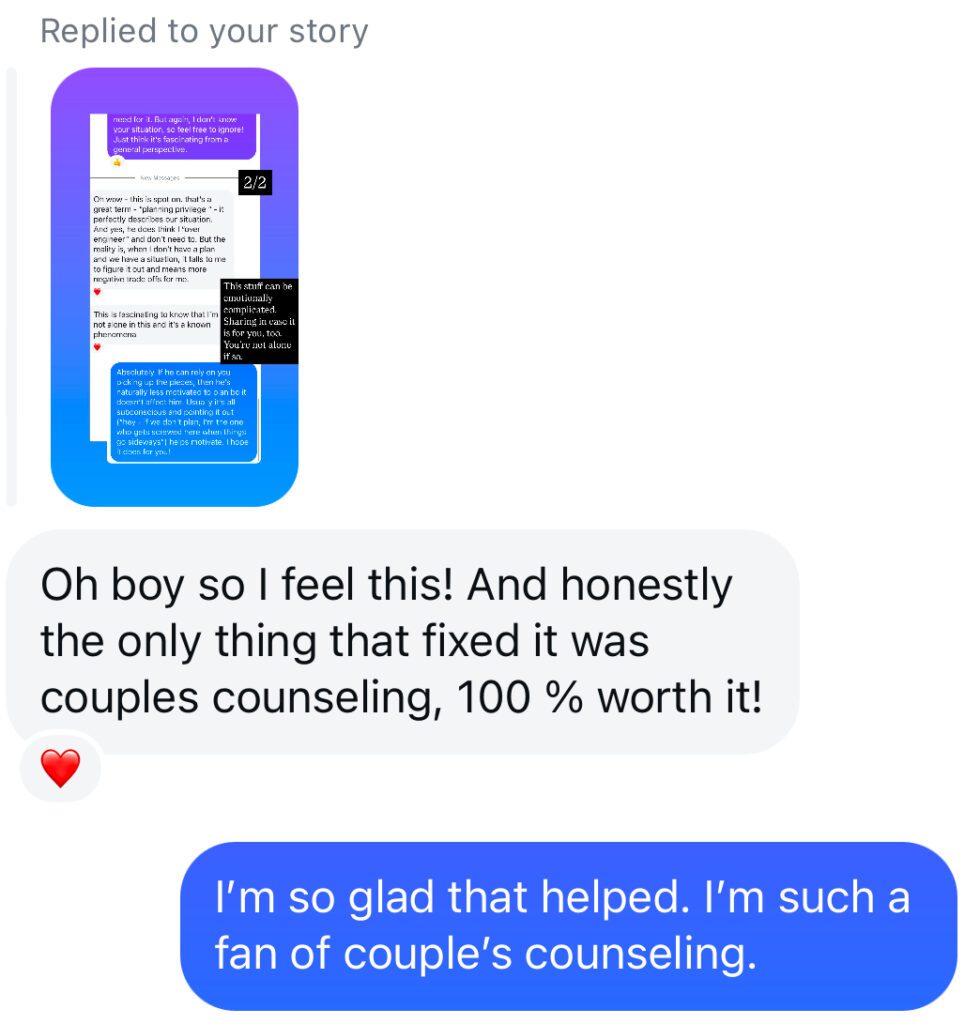
Another person mentioned Fair Play helps on this front, too.
Tip 2: If sharing with a partner doesn’t apply/work for you, research and decide on your third-party childcare backup options
- Grandparents
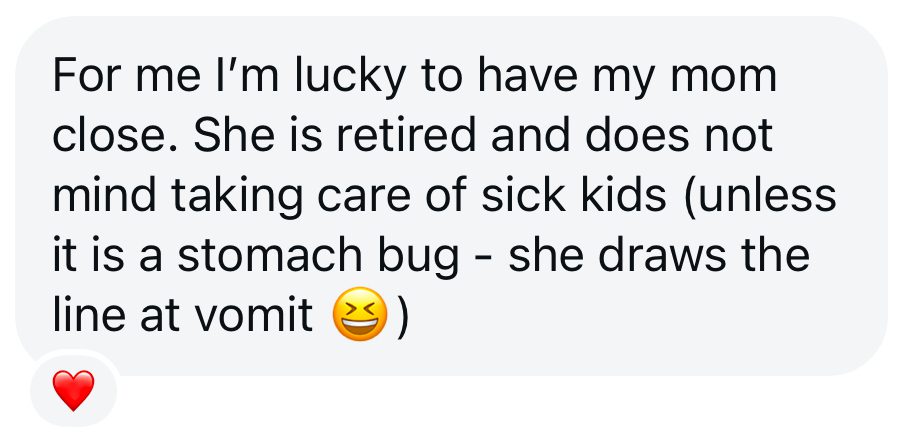
- Nanny on call
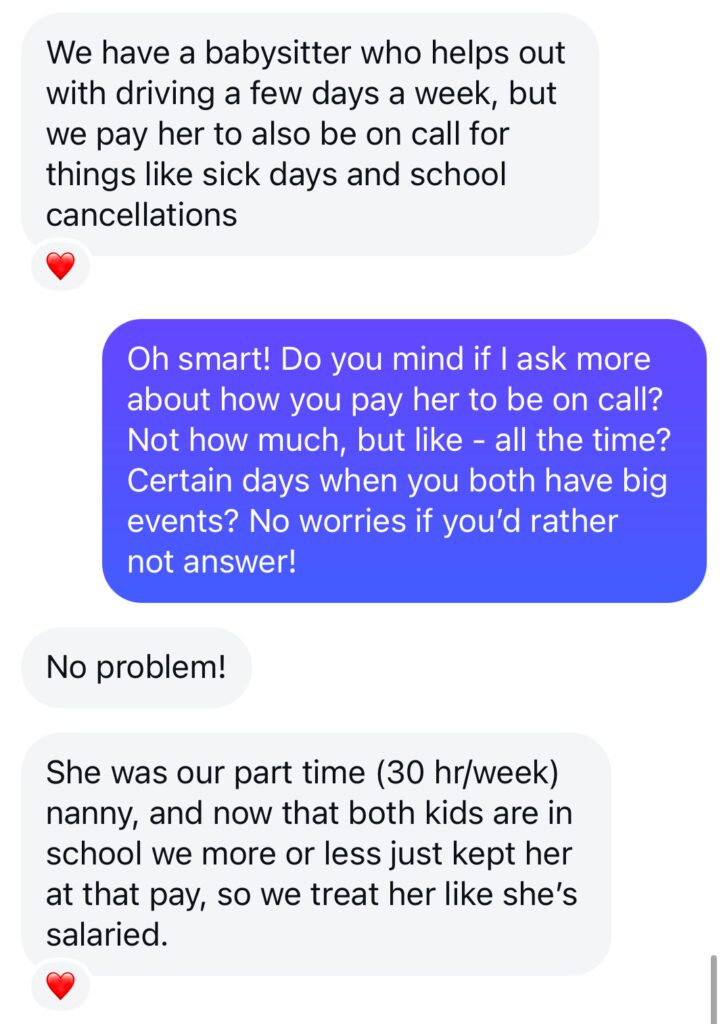
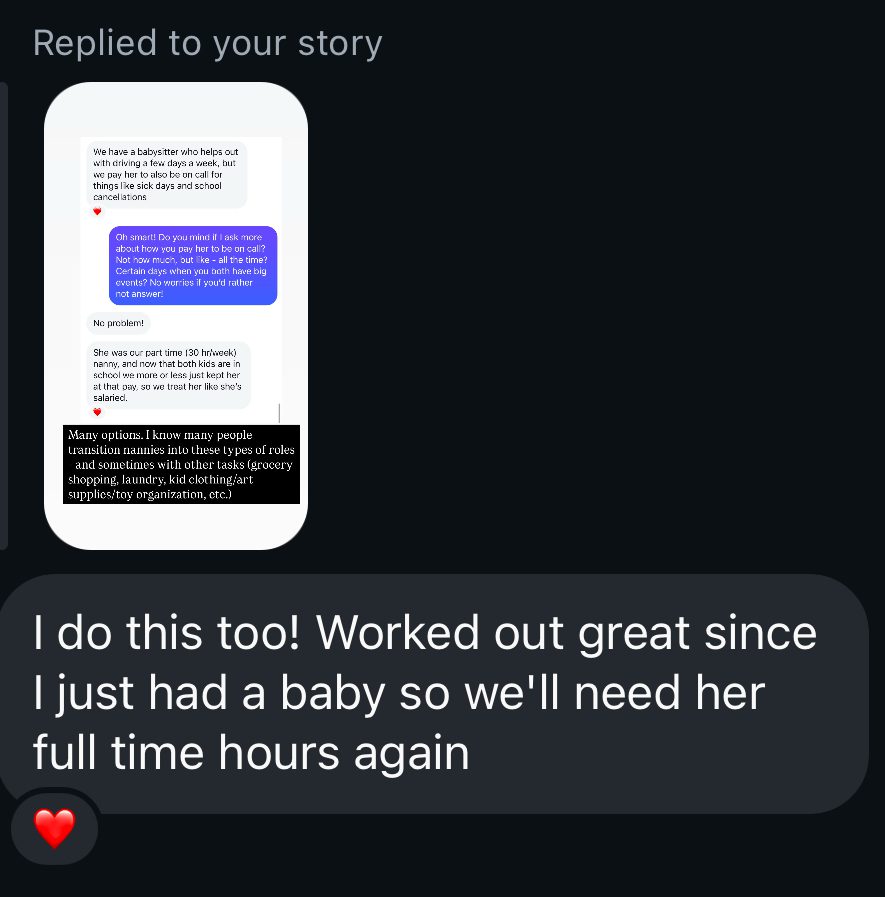
- Au Pair
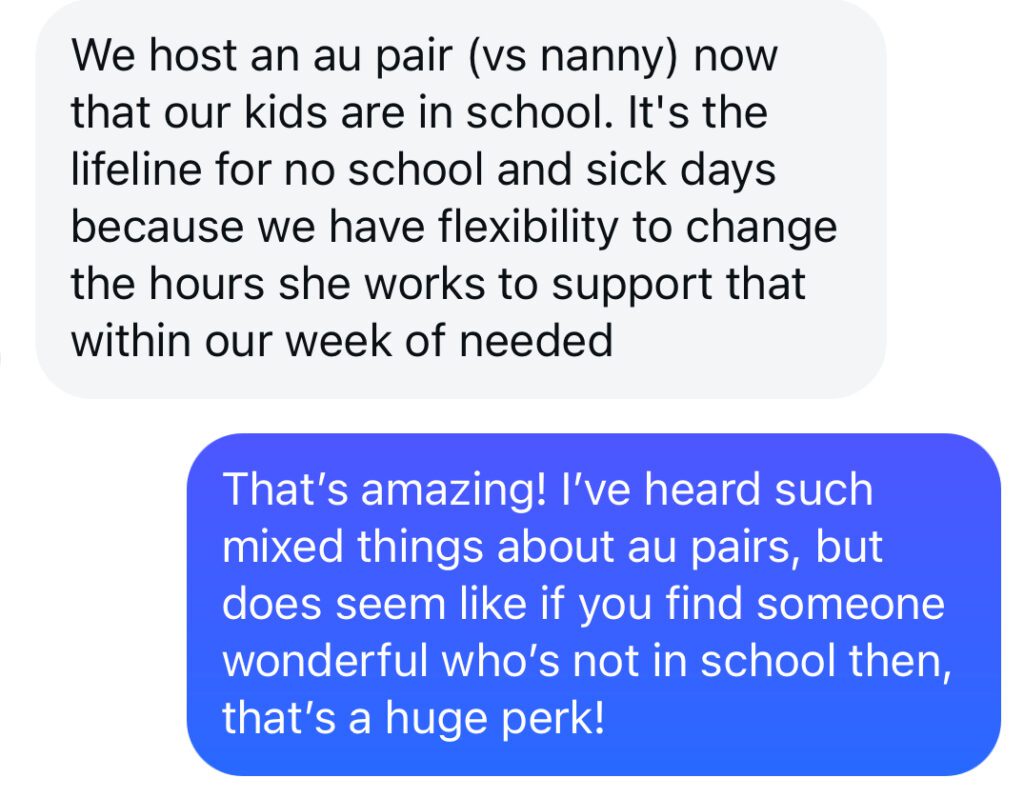
- Third-Party Backup Care / Sitters – and look for employer benefits!

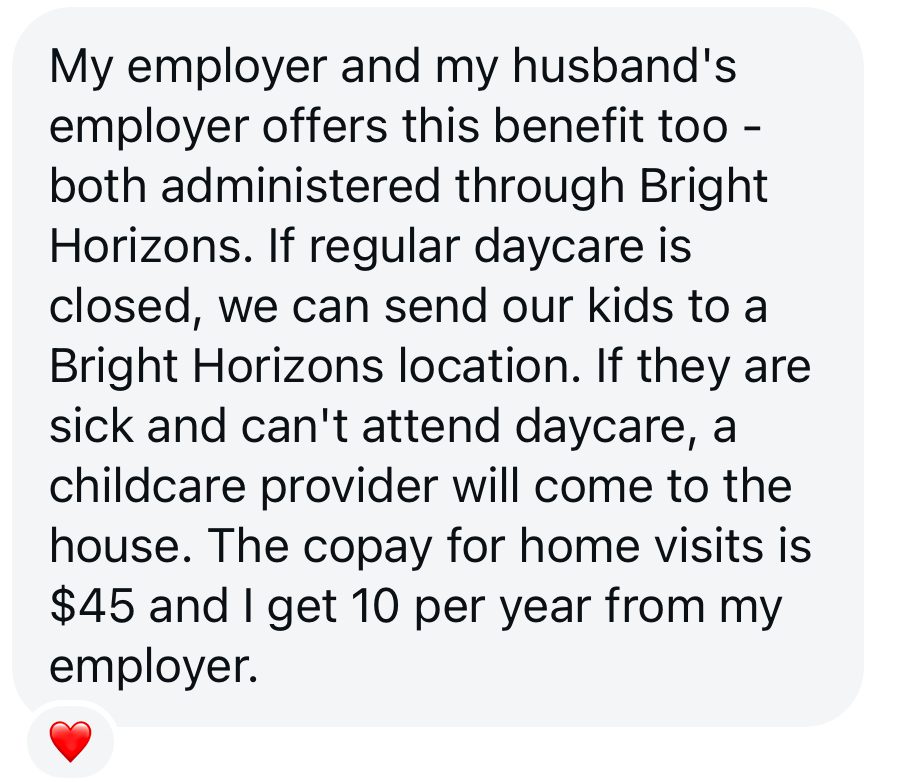

An option is to see if your company offers any support on that front. Some organizations at the very least compensate for the added burden of finding childcare when kids are sick.
Outside of that, some people have found sitters who will still watch kids who are sick (and very sick). In the words of one woman who has such sitters:
“The way we do it is by creating redundancy in the system. We have 3 babysitters that we use at least two days a week each (one comes in the mornings). When someone is sick, one of them is usually able to stay, if not for the full day, most of it.”
Someone else said that Care.com has some childcare providers who are open to caring for kids who are sick. Instead of waiting until kids are sick, it’s worth trialing and hiring some sitters for this purpose now when kids aren’t sick so that you all have time to develop the relationship and familiarity with them and between them and the kids now. In addition, you have time and breathing space to work out their parameters for working when kids are sick (e.g., if a kid is throwing up? having diarrhea? has a 103+ fever? Will they take the kids to the pediatrician, if necessary?) and if there’s additional pay in those scenarios before the situations arise.
If you don’t have those options or decide they’re not for you, then you’re likely limited to sharing backup responsibilities with your partner or co-parent (depending on the relationship), if you have one.
⚠️ Keep Your Backup in mind as you Schedule
Regardless of who your option is for backup, I encourage you – to the extent you can – to schedule your most critical meetings only for when you have a backup option and, in the case of a partner, co-parent, or even hired help, putting that window of time in their calendar. For example, when I give a corporate workshop, I block the time my husband is on backup in his calendar, including the time before the talk when I’ll want to prep and get situated through until about 20 minutes after the presentation. That helps keep it on his radar and helps him not book his own critical meetings over that window (and I can play his backup where he needs it, too). I have had to use him as backup many, many times. It definitely helps with the stress of a kid being sick to also not have to sweat that important-work-meeting conflict issue as intensely.
(If this way of calendaring sounds interesting, you might love the Bright Method. You can try it out for free in my free 5-day program, the Reset & Refresh.)
Tip 3: Stock up on meds
Especially going into times of the year when kids are often sick (e.g., back-to-school, post-holiday weeks), make sure you have the common remedies/medicines you use on hand. For me, this means stocking up on children’s Motrin and children’s Tylenol.
Once we’re in those sick-prone periods, it’s historically been harder to get the meds when you need them. Better to have a good supply going in.
(I typically do this as part of the back-to-school prep. If you want to see my other back-to-school tips, click here.)
Tip 4: (A weird one) Deciding whether your approach is to keep a sick kid and healthy kid separate – or not
This tip is kind of random, and feel free to skip it – but it pretty significantly has affected my stress levels when kids are sick, so I figured I’d throw it out there.
When I had my second kid, we tried our best to keep the girls apart if the oldest was sick for obvious reasons. The second was a baby, and we didn’t want to deal with the fever/spinal tap issue.
Once she aged out of that issue, after a few attempts to keep a sick kid and a healthy kid separated, we now don’t separate our kids unless the illness is really bad.
Here’s why: when I separated my kids, often the healthy one would still get sick – but only on the tail end of when the first kid was sick or after. So, we were essentially staggering the illness in a prolonged way, causing disruption for longer. If we could overlap their illnesses, instead, it meant less time with kids at home and all parts of our lives thrown into chaos.
Now, with only some exceptions (covid and maybe a horrible tummy bug), I’m basically like, “share water bottles, kids!” If they’re both going to be sick, I’d rather everyone get sick at once so that we can be done with it sooner.
Plus, this approach is a lot less stressful for me. I used to stress so much trying to keep the kids separated – ”H, give G more space!” “Did she sneeze on you??” “Was that your spoon or hers?” – and now, not caring and even wanting them to share germs is much easier on my nervous system.
This is a personal call, and I’m not saying everyone should do what I do, but it’s helpful to know your approach before you get there.
Tip 5: Have a solid time management system in place (I know, I know…)
I know this sounds self-serving, but I just believe in this stuff so much that I have to put it out there. Whether you use the Bright Method or some other system, make sure you have a system to manage your time and tasks in a way that helps you avoid overcommitting at work, protect breathing space within your work life and personal life, and even build in extra flex time for the seasons where you know illness is most likely to pop up.
You need your non-curveball/ baseline days to be solid and not overwhelming so that you go into these bonkers-weeks feeling rested and not already overwhelmed.
Sick kids throw a major curveball at us. If we’re already overworked, adding in a sick kid is a recipe for a very stressful disaster. Make sure you’re using a system that helps you keep your workload reasonable, protects your breathing space, and helps you pivot when you need to (and more on how to pivot when illness strikes below).
If the Bright Method sounds interesting to you, you can try it out for free in my free 5-day program, the Reset & Refresh.
Tip 6: Intentionally create emotional reserves so you have some emotional bandwidth when these things strike
Speaking of having breathing space, one of the biggest things I’ve changed recently is prioritizing things that give me more energy so that I have emotional reserves when curveballs hit (like a sick kid at home). For me, reducing the activities I take on, not drinking alcohol unless I’m out with friends (so, usually once a week to once a month), and more has helped me protect my sleep and energy. It’s been game-changing for how I respond to curveballs (I’m still not perfect, but I’m just able to absorb emotional punches much better now). For more on this, check out this podcast episode.
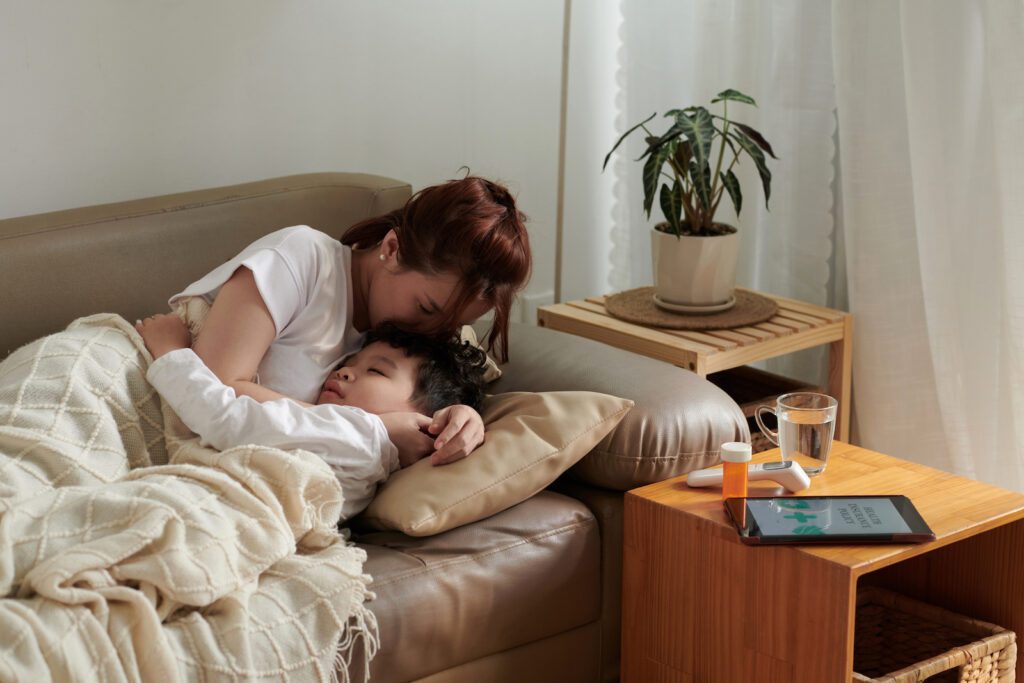
Things to do once a kid is sick and you have to work
When sickness strikes, man, those weeks are hard. No amount of time management wizardry can change that.
They involve late nights working knowing tomorrow won’t allow for much. Sleepless nights caring for kids. Tired days rolling with the punches and trying to decipher and take action on symptoms.
Sure, there are time management strategies that can help, but these weeks are hard. Period. If they’re brutal for you, too, we’re normal. Or at least we’re in it together.
That said, here are some tips.
Tip 6: Embrace Instacart
For meds, soup, crackers, and food for you, rely heavily on Instacart, Grubhub, or whatever service you can to make your life easier. That’s the tip. Short and effective.
Tip 7: Know that a kid’s upset stomach can mean strep
Another short tip – but so important to know.
Up until about six months ago, I thought strep presented only as a sore throat and maybe a fever.
Nope. When you’re dealing with little kids, strep can present as anything from vomiting to diarrhea to a kid complaining that their tummy hurts (and who knows what else). My mantra now is, “when in doubt, check for strep!”
And finding out it’s strep is actually great news because they can get on antibiotics and then go back to school 12 hours later (so long as they feel up to it) – so, it’s worth getting checked out for it ASAP.

Tip 8: When illness strikes, come up with a plan
When a kid gets sick, I think of rearranging your schedule as happening in two phases.
Phase 1 is the immediate phase. If you wake up to a kid with a fever, you need to first figure out what work hours you do have and what you need to move in light of that. This means knowing when someone else is in charge of your kid if that’s an option (e.g., partner, backup childcare, naptimes), and then cancelling/moving all things that fall outside of those hours or get booted by more important meetings that you reschedule into those times.
In the words of one mom who wrote in, she said, “Ha[ve] an early strategy sesh [with your partner, if you have one] where we [lay] out what we both NEEDED to do in the next week, [which] led to feeling more equitable split (even if it wasn’t at the time).”
For example, if your partner can take the morning and you the afternoon, plot that out in your calendar and then rearrange, move, or cancel meetings in light of that. Even if the divvy of the day isn’t so clear (e.g., you take the first hour, them the next two hours, then you take two…), get clear on which hours you and which hours they are in charge of the kids. Then, send off emails to move or cancel any meetings. That’s phase one, and you go from there as best you can.
Then, phase 2 is when you get a bit more breathing space (e.g., the sick kid is asleep and you have more time to really look over your calendar). Ask: How many days do I anticipate this lasting (overestimate)? What other meetings should I move in light of this? What work is going to have to get pushed out? Can I ask for an extension on that deadline now?
While you’re doing this, look at the next two weeks of deadlines. Even if a deadline doesn’t fall within, e.g., the next three days, which you expect this bug to last for, if it falls on next Monday, you might want to move the deadline out (or delegate it out) now so you have a bit of breathing room.
In addition, as you do this, don’t assume you’ll get full nap windows or perfect nights of sleep. BUILD IN WIGGLE ROOM ON THE FRONT END. I know that’s pull-your-hair-out frustrating for me to say, but we have to embrace reality. Reality is: you’re probably not going to get a great night of sleep. Or the sick baby won’t nap for long.
If they do and you get bonus time, awesome, but manage meetings, deadlines, and other people’s expectations of you in a way that assumes the worst in terms of your work hours. And then, if you can, you can overdeliver – but underpromising on the front-end of illness is how you’re going to keep your own stress levels somewhat tolerable and not drop balls.
Similarly, during one strep episode last year (before I knew it was strep), my emotional downfall was wishfully thinking I could turn on the TV and just work next to my oldest as she watched TV. It didn’t work. She was pretty sick, so I spent all morning trying to figure it out, going out to buy things for her (with her, so it was slower), etc. Expectations are EVERYTHING. Plan for less, and then be pleasantly surprised if you get in 30 minutes of work in an awake window.
In the words of one mom, “Honestly, I just have to embrace working less. Some stuff isn’t going to get done.”
And another, “Asking for grace from people, they’re a lot more giving than we think!”
(Note: This is a reason I love the Bright Method. If you follow it, you have roughly the next two weeks laid out pretty cleanly when illness strikes. While that might sound bad (i.e., wasted planning), it’s definitey not. Doing so has given you a manageable workload assuming a healthy set up with wiggle room, which makes it more manageable to adjust (versus an already-unmanageable workload) – plus, you’re only rearranging 2-3 weeks of work versus trying to figure what among ALL of your work needs to shift. The clarity you gained while planning helps you focus on what really needs to move and makes the lift easier – not easy, but easier.)
Tip 9: Tips for finding time to work
If you can’t only work when kids are asleep, here are some tips for finding pockets of time to work:
- Screentime: Even if you don’t normally allow screen time, embrace it for when kids are sick. The distraction helps them get through the day – and you, too. One caveat: if I know I need my kids to leave me alone for, e.g., an hour call that’s really important, I save screen time for that period of time so the novelty hasn’t worn off by then.
- Moving naptimes: This is more for when you have a meeting that falls outside of a naptime. If I have this, I move up naptimes if I have a kid who still naps. So, if the sick kid normally naps at 12pm but I have an 11am meeting I can’t move, then I put her down at 10:45am and might add in an early afternoon nap to help get her to bedtime. Since the poor kid is sick, it’s usually not an issue to put her down early.
- Go on a walk & take a phone call: If weather allows, going on a walk with snacks for the kid can be a good way to take a phone call.

Tip 10: Be intentional with the environment & what work you can do it in
To the extent you can, if you have to work when kids are awake, matchmake what you try to do with your reality. For example, when kids are awake and you’re around them as they, e.g., watch a movie, know that their requests for food/drinks/you and the sound of the tv might be too disruptive to your ability to think deeply on a subject.
Save those higher-focus-required work tasks for when the kid is asleep, and focus on working through the lower-focus-required, bite-sized work (e.g., email, smaller and easier tasks) for when you’re on a laptop on the couch with kids.
Along these lines, another mom recommended embracing phone apps for things like Slack/Teams and email, which can be great as they can allow you to respond to messages on the go as you move around the house helping kids.
Tip 11: Throughout the day, keep a list of tasks you need to handle (work and personal)
If you’ve been here long, you know I’m anti-to-do lists as the main means for how we manage our time and tasks. That said, when sick kids are at home and everything is a bit of a free-for-all, I completely get how making a list to corral all the things that need to get done makes sense. There’s no judgment here, and I wanted to share this as someone wrote in that this worked for them – and I can totally see why given the context.
This mom said,
“I keep a note on my phone of emails or things I need to take action (that come in during the day) at night. I find that looking at my calendar is more stressful during those days because I’m reminded of everything I’m missing out on or should be attending. Mentally, I cannot take care of a sick child and do work so I limit myself to reading emails during the day and keeping track of what needs actioning at the end of the day.”
While I hope the planning adjustments above (see tip 8) help alleviate the looking-at-my-calendar-is-unbelievably-stressful component of this, I also completely get this approach. When you’re consumed by caregiving, there is a simplicity to just using your phone or pen and paper to keep track of the major things you need to respond to at night/during naps.
Just try to still be realistic about how long things take and what time you have to give to it – and know some things will have to get pushed – it’s just the nature of the beast. You cannot do the same amount of work you’d have done with a full day of work in 2-3 hours after bedtime – you just can’t. Embrace that reality now for your own sanity and so you don’t drop balls.
Tip 12: Still take care of yourself – including your sleep
As one mom said (and I’m including her whole comment for context):
“[Working and taking care of a sick kid is] the worst. I only have one kid, we both have flexible jobs and work from home, and we have family in town, and I still sometimes lose it when sicknesses abound. I do not understand how ppl do it without these things. We have #2 coming, and I’m not prepared for how that will change things, but also so thankful that we have all of the things mentioned above. I think I’ve just come to terms with the fact that when they are sick, things just don’t get done. Ruthless prioritization is the name of the game. Sometimes a bath after she goes to bed is way more important than any email, dish, or laundry basket.”
This is really hard to do sometimes, but I couldn’t agree more – especially on the sleep front. It’s so tempting to work really late into the night when kids are sick, and sometimes, it’s necessary. But challenge yourself on what is TRULY necessary. Just because someone says they want something tomorrow does not make it a necessity if there’s not external deadline demanding it be turned in (and even then, often deadlines can be moved or someone else can be found to do the work). If the work isn’t a necessity, let it go for now and get some sleep.
(And if you need to, use a meditation app to slow your brain down to get there.)
Getting solid sleep is important for you to stay healthy (or get less sick), turn in okay quality work for the stuff you have to do while your kid is sick, and to your own emotional well-being. Prioritize it.
Tip 13: Havind gratitude for normally healthy kids if you have them AND acknowledging that it’s really fricking hard and stressful
While I think being told to be grateful can be aggravating at best and unhealthy/toxic at worst, I always genuinely feel this when my kids are sick: I’m so grateful my kids are normally healthy. I never have as much respect for parents who have medically-complicated kids as I do when my own kids have a common illness, and I just bow down to them. It’s pretty humbling to see two days of strep after a week of a bad cold break me when I think of what other parents go through.
At least for me, keeping my situation in perspective is important and helpful for my sanity. As my grandmother says, “If we all threw our problems up in the air and saw everyone else’s, we’d snatch our own back real fast.”
But hear me when I say this: You can be grateful in this way AND still acknowledge that it just royally sucks. Especially when you’re on your third illness in 2-3 weeks, it just so grating and defeating and exhausting.
As some parents shared when I asked for their advice,
- “I got nothing, this shit is hard. <3”
- “The truth is- we don’t know how to manage and it’s awful. Just so much stress.”
It is. It is so hard.
Both of these things – the gratitude and the hard – can exist together.
Tip 14: Remember that it gets better
One mom said that “remembering it’s temporary” helps her a lot, along with therapy and sleep meds.
Another mom sent this encouraging message,
“Someday, they will both be in school. It will happen. And they won’t get all the bugs. It happens when they are little because they have never had them, but elementary age is so much healthier. No more croup, hand foot and mouth, endless ear infections, etc. We get occasional strep; that’s about it. But then you get sports schedules, but I can plan for that and use my many color-coded Google calendars.”
For me, that’s the best thing to hear and remind myself of. For me, when a kid gets sick – and I have to deal with the complicated work logistics and cancel fun plans I’ve been looking forward to – in addition to all of that fun stuff… well, I feel like it’s all also exacerbated by it feeling too much like the pandemic and all of those awful, anxious, frustrated feelings resurface. Reminding myself that this is different and temporary really helps.
Conclusion
That’s it. It’s terrible – and temporary (but a temporary that feels like a really long time when you’re in it).
None of these strategies will solve the problems or the stress. But I hope they provide you with some relief and a nugget or two that helps you feel more empowered as you manage it all. Good luck, and please feel free to share any more strategies in the comments below. I’m sure we could all benefit from them!
Other Related Articles:
What Do Working Moms Do in the Summer – 12 Practical Strategies
Career or Kids: When to stay, leave, or scale down your career for kids – at least for now
